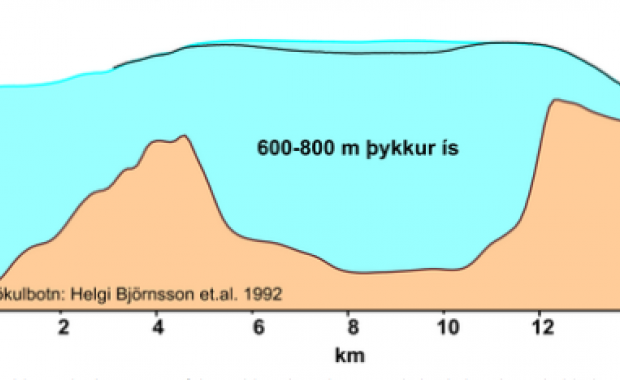The subsidence at the Bárðarbunga caldera is so great that the GPS station located on the ice surface is now below the caldera rim and not delivering any sign as it is out of sight of the relay station in Mt. Kverkfjöll.
Scientists flew over Bárðarbunga on November 26th to collect new data. According to the Scientific Advisory Board of the Icelandic Civil Protection the total depression of the caldera is 50 meters (164 ft.) and the total volume of the depression about 1,4 cubic kilometre (0.334 cubic miles) since the seismic activity started in mid-August.
This is the largest subsidence that has been measured in modern times at a caldera in Iceland.
The Icelandic Met Office reports that the rate of subsidence in the centre of the caldera has decreased slowly but the subsided area has also broadened. The change in volume since the last measurement, November 4th, corresponds to a magmaflow of 130 m³/s. This is less than the first month, when the estimated flow was close to 200 m³/s.
Bárðarbunga is at the center of a 200 km (124 mi) long volcanic system, the huge 10 km (6,2 mi) wide caldera is located underneath a 600 to 800 meters (1,968 to 2,625 ft.) thick ice cap in Vatnajökull glacier.
The ongoing Holuhraun eruption is in an ice free zone in the central highlands, about 41 km (25 mi) north of Bárðarbunga.
The subsidence at the Bárðarbunga caldera is so great that the GPS station located on the ice surface is now below the caldera rim and not delivering any sign as it is out of sight of the relay station in Mt. Kverkfjöll.
Scientists flew over Bárðarbunga on November 26th to collect new data. According to the Scientific Advisory Board of the Icelandic Civil Protection the total depression of the caldera is 50 meters (164 ft.) and the total volume of the depression about 1,4 cubic kilometre (0.334 cubic miles) since the seismic activity started in mid-August.
This is the largest subsidence that has been measured in modern times at a caldera in Iceland.
The Icelandic Met Office reports that the rate of subsidence in the centre of the caldera has decreased slowly but the subsided area has also broadened. The change in volume since the last measurement, November 4th, corresponds to a magmaflow of 130 m³/s. This is less than the first month, when the estimated flow was close to 200 m³/s.
Bárðarbunga is at the center of a 200 km (124 mi) long volcanic system, the huge 10 km (6,2 mi) wide caldera is located underneath a 600 to 800 meters (1,968 to 2,625 ft.) thick ice cap in Vatnajökull glacier.
The ongoing Holuhraun eruption is in an ice free zone in the central highlands, about 41 km (25 mi) north of Bárðarbunga.







